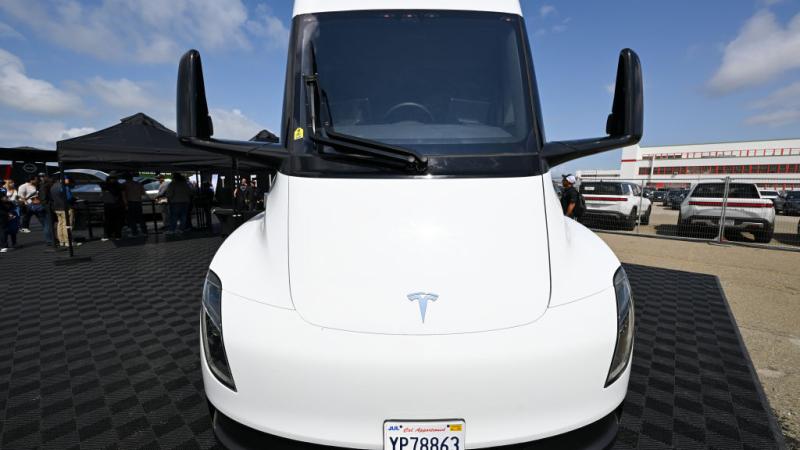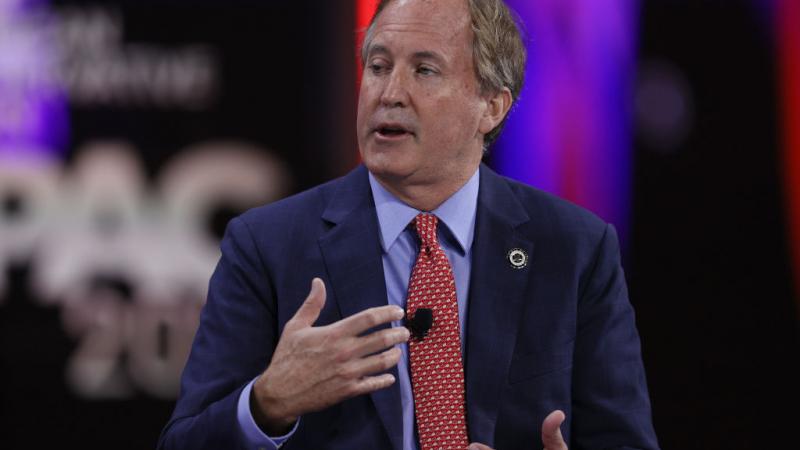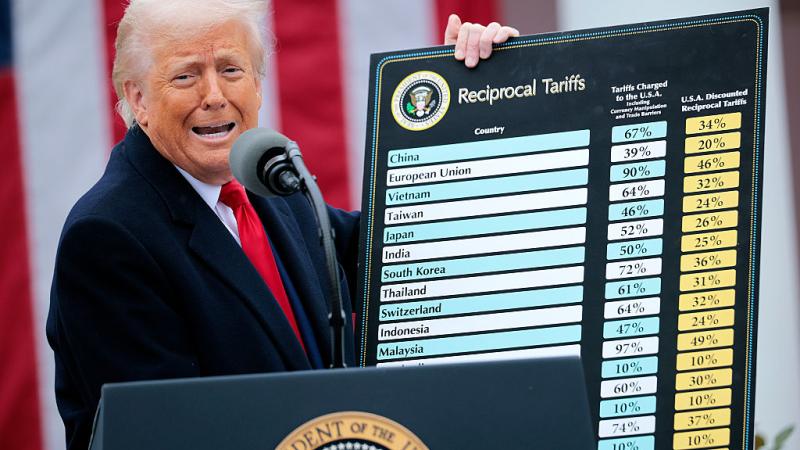Fossil fuels promote health and prosperity, experts say during Natural Resources Committee hearing
Flipping the narrative: Dr. Kevin Dayaratna, senior research fellow with the Heritage Foundation, argued that research shows that the correlation between higher energy consumption and quality of life are a "universal pattern."
A House Committee on Natural Resources hearing Wednesday concerning American energy dominance had Republicans examining the role of affordable, reliable energy from fossil fuels in improving the U.S. economy, health and the federal budget.
Democrats and the minority witness, however, argued that building out wind and solar, as attempted by the Biden-Harris administration, would bring down energy costs, improve energy reliability, and protect Americans’ health.
“Today’s hearing on so-called energy dominance presents us with a clear choice. We double down on fossil fuels that pollute our communities and drive up costs for working Americans, or we invest in a clean energy future that creates jobs, strengthens national security, and lowers household energy bills for decades,” Rep. Maxine Dexter, D-Ore., said.
Effect of fossil fuels from a wider perspective
Although she is neither a meteorologist nor an economist, Dexter said she based her position on her credentials as a pulmonary critical care physician. Dexter also said that pollution from the use of fossil fuels hurts lower income communities the most and leads to “higher rates of asthma, cancer and other life-threatening illnesses.”
Entities opposing "The Green New Deal," such as the Heritage Foundation have commissioned research papers that come to a different conclusion. In "Climate Change, Ozone, and Asthma: Is There a Connection?," medical and environmental researchers said that "The ozone–asthma hypothesis is not founded on proven biological plausibility of ozone causing asthma symptoms or development of asthma."
Dr. Kevin Dayaratna, senior research fellow with the Heritage Foundation, disputed this outlook on the overall impact of fossil fuels. “Access to affordable and reliable energy is not just a convenience, it's the foundation of a thriving society — from brewing a morning cup of coffee to powering life saving hospital equipment to conducting this very hearing. Energy is woven into every aspect of modern life and throughout history,” Dayaratna said.
Dayaratna said that the Heritage Foundation’s research has shown that historically, there’s a “universal pattern” across all nations that higher energy consumption leads to higher markers of human improvement, including life expectancy, access to clean water, per-capita income and decreased infant mortality rates.
A Heritage Foundation analysis, Dayaratna said, examined the impacts of energy policies that the Biden administration had enacted as a means to phase out the use of fossil fuels, including halting oil and gas leases on federal lands and electric vehicle mandates. The analysis found that over an 18-year period, these policies would have resulted in an average employment shortfall of 1.2 million jobs, income losses for a typical family of four exceeding $5,000 per year, and a total GDP loss to the country of $7 trillion.
The Heritage researchers then measured the impacts to the climate that would result from these costs. Using the models from the Intergovernmental Panel on Climate Change, a U.N. consortium of the world’s leading climate scientists, the analysis determined that if the U.S. somehow eliminated 100% of all fossil fuel use, which Dayaratna called a “highly unrealistic scenario,” the reduction in global warming would be less than 0.23 degrees Celsius, which is roughly 0.41 degrees Fahrenheit.
Renewable technology's contribution scrutinized
Megan Gibson, senior attorney for the Southern Environmental Law Center, argued that instead, the best route to affordable, reliable energy is through the buildout of wind and solar energy, backed up by battery storage. Gibson said that in 2024, 90% of new utility scale capacity came from wind, solar and battery storage. “These technologies are now the cheapest, fastest-to-deploy sources of power,” Gibson said.
Gibson said that during a heat wave last summer, solar and batteries supplied 25,000 megawatts in Texas, which she said kept the lights on in Texas that day. In her submitted testimony, Gibson elaborated on that claim.
During the Aug. 20 heat wave, the total demand in Texas was 86,000 megawatts. The testimony cites an article on the website of GridLab, a 501(c)3 charity that helps implement renewable energy policies. Energy consumption is traditionally measured in watt-hours, but the GridLab article refers to "watts." Assuming the figures in watts are actually watt-hours, according to the article, solar and batteries accounted for 29% of the total on that day.
The bulk of Texas’ electricity, however, is generated from natural gas, coal and nuclear. So, while solar and batteries played a role in satisfying electricity demand on Aug. 20, the primary generators "keeping the lights on" were fossil fuels and nuclear. In supporting her claim that renewables drive down costs, Gibson referred to a study by Energy Innovation, which advocates for the wind and solar industry. Energy Innovation LLC is a for-profit San Francisco-based energy and environmental policy firm, owned by its employees and leadership. The study found that 99% of coal plants are more expensive to run than to replace with wind and solar power.
The study based its analysis on figures from the U.S. Energy Information Administration’s “Levelized Costs of New Generation Resources in the Annual Energy Outlook 2022.” The report explicitly states that the figures in the report are limited, and making direct comparisons “across technologies [is] problematic and misleading as a method to assess the economic competitiveness of various generation alternatives.”
Gibson: 'China racing ahead'
Gibson also claimed that by not advancing wind and solar energy, the U.S. was losing a race with China. “China is racing ahead in clean energy production. If we slow down now, we risk seeding American leadership in the very industries that will power the global economy,” Gibson said.
While China has installed a lot of renewable capacity, according to a report from the International Information Agency, the country nonetheless consumes 40% more coal than the rest of the world combined, most of which is for power generation. “China’s influence in global coal market trends is unparalleled by any country for any type of fuel, with China’s share of global coal consumption now standing at 58%,” the IEA states in its “Global Energy Review 2025” report.
Seeking solutions
Resident Commissioner Pablo José Hernández of Puerto Rico, a Democrat, said that fossil fuels are driving the “climate crisis” and asked Gibson about how renewables can bolster community energy resilience after natural disasters. He also said that Puerto Rico is facing a shortage this summer of 800 megawatts of capacity.
“I'll be very transparent. I'll take whatever I can find in terms of energy sources to prevent power outages in the summer, even if tomorrow we discovered the dirtiest source of energy in the history of the world. Obviously, it doesn't have to be that way if we had to find a temporary solution to that generation problem. Could renewables be an alternative, given the ease of scaling them up quickly?” Hernández said.
Gibson said that wind, solar and batteries are easier and faster to scale up in response to such crises than fossil fuel infrastructure. “I'm not an engineer, but I'm sure that there are people smarter than me that could provide that answer to you. But I will say that again, it's faster and cheaper, period. That's what the evidence shows,” Gibson said.
Glen Sweetnam, an electrical engineer and distinguished fellow with the Energy Policy Research Foundation, disputed Gibson’s suggestion. He recommended that the island nation could more easily satisfy its energy demands with a floating gas turbine on a barge. “People who need power rapidly on the order of 800 megawatts, if you bring a gas turbine on a barge and use that, you can hook right into the grid,” Sweetnam said. The fuel could be provided, he said, with a liquefied natural gas barge, which he said is easy to lease.
“That is something that we have heard and that I believe the administration is considering. And like I said, I'm more interested in solving the problem right now than necessarily in the issue of energy,” Hernández said.
The hearing highlighted a large gulf between Democrats and Republicans on what energy policy in the U.S. should look like, and the only common ground is the end goal of those policies: “We can agree that making energy prices more affordable for all Americans is something we can all get behind,” Rep. Mike Collins, R-Ga., said.
The Facts Inside Our Reporter's Notebook
Links
- House Committee on Natural Resources hearing
- Dr. Kevin Dayaratna
- Intergovernmental Panel on Climate Change
- Megan Gibson
- submitted testimony
- an article
- GridLab
- watt-hours
- generated from natural gas, coal and nuclear
- study by Energy Innovation
- Energy Innovation LLC
- Levelized Costs of New Generation Resources in the Annual Energy Outlook 2022
- International Information Agency
- Glen Sweetnam
- Energy Policy Research Foundation















